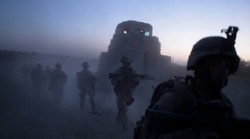
Correction: An earlier version of this post reversed the first and last names of Hell and Back Again director Danfung Dennis. We regret for the error.
Hell and Back Again
One of the attractions of the documentary form is the unpredictability of real life. A filmmaker might set out to make a film on one subject, only to have an entirely new, much more compelling story emerge in the midst of shooting. That appears to be exactly what happened with photojournalist Danfung Dennis’s Hell and Back Again, which appears to have began as an attempt to document the war in Afghanistan in much the same way that Sebastian Junger and Tim Hetherington’s Restrepo did. The footage from the front lines feels cut from the same cloth, which includes the stomach-churning anxiety of watching fire fights from right in their midst, close enough to the action to feel a palpable sense of danger through the cameraman’s lens.
What Dennis couldn’t have predicted is that one of his primary subjects in the platoon in which he was embedded would sustain a life-altering casualty, and the film became the focus of a wholly different movie. Hell and Back Again becomes less about the “Hell” and more about the “Back Again,” spending most of its time following Marine Sergeant Nathan Harris on his difficulties back home, following a gunshot wound that broke his hip and leg. He’s left unable to walk, with a metal rod in his leg, and spends most of his time either in excruciating pain or woozy on a cocktail of high-intensity painkillers.
While plenty of documentaries about the emotional aftermath of the war seem to seek out subjects who, as part of their post-combat life, are reflective and even questioning of the validity of the particular conflict they served in, that’s not the case with gung-ho Harris.
He relays the story of his first interview with a recruiter, where he revealed his motivation to join the Marines because of a long held desire to kill people. The recruiter, according to Harris, told him that was the best reason to sign up he’d ever heard. Even now, barely able to get around on his own, Harris wants nothing more than to be back on the front lines with the enemy in his sights.
His obsession with guns around the house, often to the visible discomfort of his increasingly exasperated wife, and his frequent tendency to zone out or hold his head from the pain (which Dennis uses as an opportunity to suggest that he’s flashing back to Afghanistan, allowing the filmmaker to segue to the war footage), suggest a man with potentially dangerous violent tendencies and a good deal of emotional damage. One scene of Harris pointing his weapon threateningly at a friend in the car is truly frightening.
Dennis’s film ends without any sense of resolution for Harris, and the suggestion that he’s got a long road to recovery ahead. The doctor tells him his leg may take a year to heal; it appears a full recovery from the hell he’s been through may take far longer.
Hell and Back Again screens at AFI Silver 2 at 11:45 AM on Wednesday, June 22, and at 3 PM on Thursday, June 23. Individual tickets and festival passes (prices vary) available at the Silverdocs Web site.

Better This World
Casualties are a given in any war. Among the most heartbreaking are the individuals who were standing on the sidelines, only to find the front lines shifting to meet them. Better This World examines one specific case of the collateral damage of the war on terror: the imprisonment of two young men, David McKay and Bradley Crowder, on domestic terrorism charges. Both freely admit that they made Molotov cocktails during the 2008 Republican National Convention. The point of contention that is the core of their defense—and that the film takes up—is the government’s role in possibly entrapping the two by directly influencing them to create weapons they never would have considered making otherwise.
While it’s clear that directors Kelly Duane de la Vega and Katie Galloway are on the side of McKay and Crowder, the film never shies away from the mistakes they make. There are no strident conspiracy theories, and the filmmakers speak candidly with a number of FBI officials involved with the case, taking their comments in at face value. There are only a few facts that are in question, and the core of the government’s case is not whether or not the pair had the bombs, but what—if anything—they really planned on doing with them.
How the FBI comes by their assessment of the threat that the pair presented is where the film becomes a fascinating study of the methods employed in combating terrorism in the wake of 9/11. As those methods are revealed, the story hits a twist about halfway through—that we won’t give away—that continues to unfold in surprising ways throughout the rest of the film. It calls into question not only the motivation for the actions McKay and Crowder take before their arrest, but their decisions while awaiting trial as well.
It’s hard not to feel sympathy for at least the friends and family of these young men, who must sit by while they make choices that will affect the rest of their lives, and in which none of the options are very attractive. They’re stuck between the rock of a federal government that gets convictions in 90 percent of cases like this and the hard place of plea deals that will still result in jail time. Better This World conveys the helplessness and hopelessness of what it’s like to get caught in a system that, the film argues, values appearance over facts.
Better This World screens at AFI Silver 3 at 6 PM on Wednesday, June 22, and at 5 PM on Thursday, June 23. Individual tickets and festival passes (prices vary) available at the Silverdocs Web site.
Subscribe to Washingtonian
Follow Washingtonian on Twitter
More>> After Hours Blog | Arts & Events | Happy Hour Finder | Calendar of Events

















